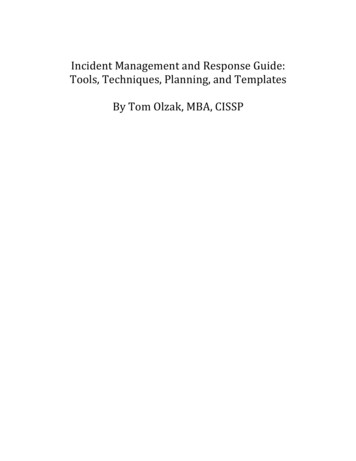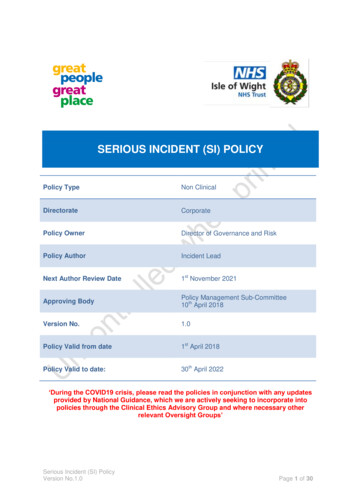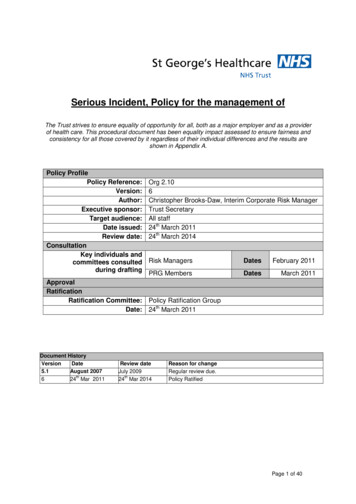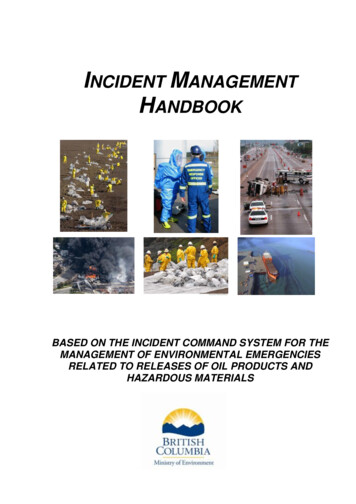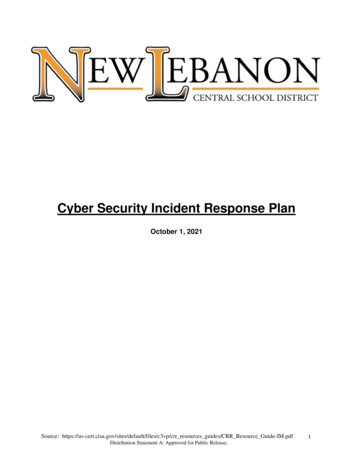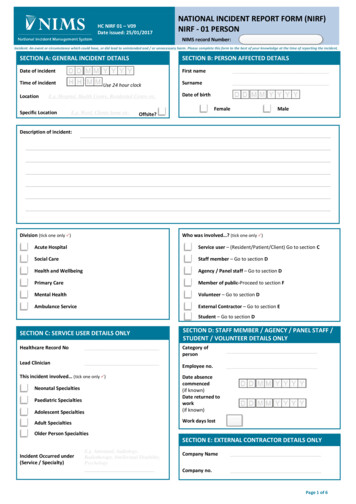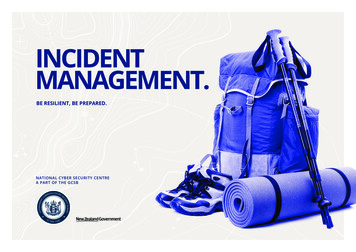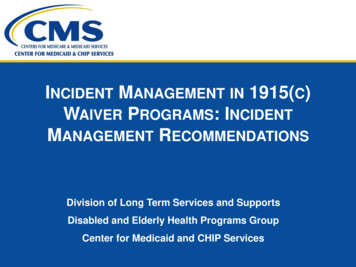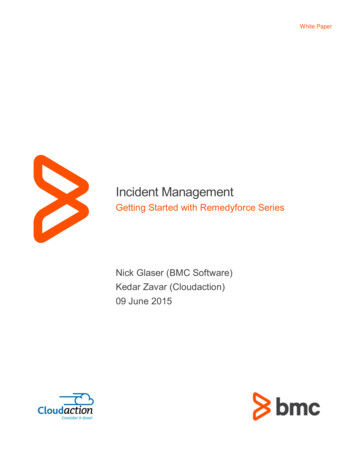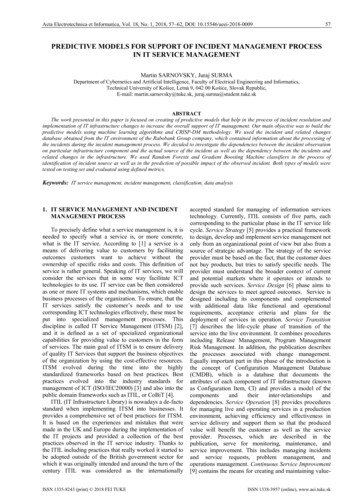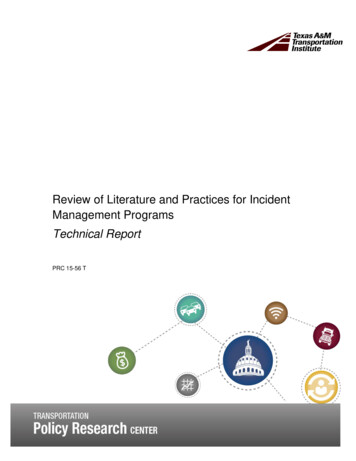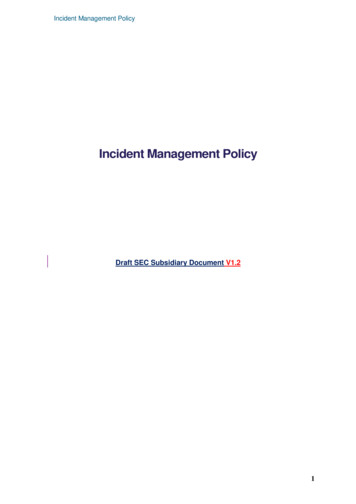
Transcription
Incident Management PolicyIncident Management PolicyDraft SEC Subsidiary Document V1.21
DEFINITIONSTermBlack StartCPNICode ofConnectionCrisisManagementDisasterError HandlingStrategyHMGIncident PartyInterested PartyKnown ErrorLive ServiceNominatedIndividualRoot CauseRoot CauseAnalysisService AlertSupplier of lastresortDefinitionThe recovery process for restoring electricity on the transmission system following either a partial or totalshutdown of the transmission systemCentre for the Protection of National InfrastructureOne of the following Subsidiary Documents: DCC Gateway Connection Code of Connection; DCC UserInterface Code of Connection; Registration Data Interface Code of Connection; Self Service Interface Code ofConnection; SMKI Code of Connection; SMKI Repository Code of Connection; DCCKI Code of Connection;DCCKI Repository Code of Connection.The planning and control of an organisation’s response to an event that disrupts the provision of servicesAn event that causes significant disruption to the provision and use of services, such that the provision anduse of service(s) cannot be sustained without the invocation of exceptional measures to recover infrastructureand/or resourcesThe procedures to be followed and actions to be taken where a Service Request or the commands or responsesrelated to it fail to provide the result expected from that type or category of Service Request as furtherdescribed in Section 4Her Majesty’s GovernmentA User, Eligible Non Gateway Supplier, Registration Data Provider, DCC Gateway Party, or AuthorisedSubscriber that may raise or, in the reasonable opinion of the DCC, may be impacted by an IncidentA Party or Registration Data Provider that is or has the potential to be affected by a Problem or IncidentA fault in a component of the DCC Total System which is used for the provision of Live Services, identifiedby the successful diagnosis of an Incident or Problem and for which both Root Cause and a temporary workaround or a permanent solution have been identifiedMeans1) any of the Services that the DCC is obliged to provide to a User, an Eligible Non-Gateway Supplier, anAuthorised Subscriber, a DCC Gateway Party (once its connection is capable of operation), but excludingTesting Services as set out in H14, and2) the exchange of data pursuant to Section E2.Means an individual who has been nominated by an Incident Party in accordance with clause 1.4.5 of theIMPis the ultimate cause of an Incident or Problema class of problem solving methods aimed at identifying the Root Cause of a Problem or IncidentAn alert notifying Interested Parties of a current issue which may impact the provision of ServicesA Supplier appointed by Ofgem to resume the responsibility for supplying gas and/or electricity to customersof a failed Supplier2
Incident Management round41.3Scope41.34 General Provisions4Incident Management62.1Pre-requisites to Raising an Incident62.2Raising an Incident62.3Required Information72.4Incident Prioritisation & Categorisation72.5Incident Assignment92.6Identifying Interested Parties102.7Communications102.8Incident Escalation102.9Escalation Process112.10 DCC Major Incidents and Major Security Incidents112.11 Non-DCC Major Incidents not Assigned to the DCC132.12 Incident Closure132.13 Re-opening Closed Incidents132.14 Re-occurring Incidents14Problem Management153.1Opening a Problem153.2Prioritisation and Timescale for Closure of Problems153.3Closing a Problem15Business Continuity & Disaster RecoveryError Handling Strategy4.1BCDR General Provisions4.2 BCDR 185.1BCDR General Provisions183
5.2Business Continuity and Disaster Recovery Procedures19184
Incident Management Policy1Introduction1.1Purpose1.1.1This document details the Incident Management Policy inaccordance with the requirements of Section H9. It deals with themanagement of Incidents, including those related to Registration Data.1.1.2[this clause is left intentionally blank]Additionally, sections 4 and 5 coverthe Error Handling Strategy and Business Continuity and Disaster Recoveryrespectively.1.2Background1.2.1The subject matter of this document is closely related to that of the IncidentManagement aspects of the Registration Data Interface Specification and theNon-Gateway Interface Specification. In order to ensure an integratedsolution to managing Incidents and the Incidents governed by thatosedocuments, certain common aspects of Incident Management are set out inthis document and cross-referred to in the Registration Data InterfaceSpecification or the Non-Gateway Interface Specification (as applicable).1.2.2The timetable for Registration Data refreshes is set out in the RegistrationData Interface Code of Connection and the Registration Data Incident typesare set out in the Registration Data Interface Specification.1.2.3Error conditions and how they should be handled are covered in Section 4,the Error Handling Strategy.1.3Scope1.3.1The Incident Management Policy details the full Incident Managementlifecycle including management and declaration of DCC Major Incidents,Problems and escalations.1.3.2[this clause is left intentionally blank]1.4General Provisions1.4.1Incidents may be raised only by the DCC or an Incident Party and inaccordance with this Incident Management Policy.1.4.2Incidents raised and managed under this Incident Management Policy mayrelate to any Live Service, other than the Testing Services set out in H14, forwhich the Testing Issue Resolution Process set out in H14.37- 45 shall apply.1.4.3In the event that an Incident Party considers it necessary to raise an issuerelating to the provision of Services but which it considers outside the scopeof Live Services or Testing Services, it shall contact the DCC directly andeach of that Party and the DCC shall, acting reasonably, agree betweenthem responsibility for resolution of the issue, which shall be resolved by theresponsible Party as soon as reasonably practicable.1.4.4Incidents shall be raised and recorded in the Incident Management Log in5
accordance with clause 2.1.4.5Each Incident Party shall provide the DCC with, and shall subsequentlyprovide the DCC with any changes to, a list of Nominated Individuals fromtheir organisation who are authorised to:a) contact the DCC to raise and record in the Incident Management Logan Incident and communicate with the DCC regarding the Incidentb) perform the roles identified in the escalation process defined in clause2.9.1.4.6Each Registration Data Provider, when providing the DCC with a list ofNominated Individuals, shall provide details of both the core operating hoursfor the Registration Data Provider and the Registration Data Provider’s outof-hours facility.1.4.7Each Incident Party shall ensure that only its Nominated Individuals shallcontact the DCC to raise an Incident.1.4.8The DCC shall ensure that only those Nominated Individuals pursuant toclause 1.4.5(a) shall raise an Incident.1.4.9The DCC shall implement an authentication procedure for confirming that acommunication is from an Incident Party’s Nominated Individual, and suchprocedure shall be commensurate with the risk to the Services and Data.Incident Parties shall comply with this procedure.1.4.10 The DCC and Incident Parties shall each ensure that information regardingIncidents and Problems is recorded and kept up to date in the IncidentManagement Log as follows:a) for Major Incidents, the Incident Party shall comply with clause 2.2.2b) the Incident Party shall use the Self Service Interface where it is ableto do so and the DCC shall ensure that information provided in thisway is automatically added to the Incident Management Logc) where the Incident Party is unable to use the Self Service Interface,it shall provide information to the Service Desk by email or by phoneand the Service Desk shall ensure that this information is enteredinto the Incident Management Logd) when an Incident is submitted by email and the Incident Party doesnot provide the required information as detailed in clause 2.3, theService Desk shall return an email to the Incident Party requestingthe missing information and the Incident shall not be recorded in theIncident Management Log until the required information has beenreceived by the Service Deske) the Service Desk shall enter information that the DCC originates intothe Incident Management Logf) the resolver shall ensure all actions to resolve the Incident arerecorded in the Incident Management Logg) In regard to items a) – f) above, the DCC and Incident Parties shalleach ensure that information is as complete as is possible and isentered into the Incident Management Log as soon as is reasonablypracticable.6
Incident Management2Incident Management2.1Pre-requisites tobefore Raising an IncidentDCC2.1.1Before raising an Incident the DCC shall use all reasonable endeavours toensure an Incident does not already exist for the issue.2.1.2Pursuant to Section E2.12(d), prior to the DCC raising an Incident regardingthe provision of Registration Data by a Registration Data Provider, the DCCshall use all reasonable endeavours to confirm that the issue does notreside within the DCC System or processes.I nci dent Parti es other t han Registration Data Providers2.1.32 For the purposes of this clause 2.1.32 and clause 2.1.43, references to“Incident Party” do not include Registration Data Providers.Before raising an Incident with the DCC the Incident Party shall use allreasonable endeavours to:a) where appropriate, confirm that the issue does not reside within theHAN, or the Smart Meter, or other Devices which the Incident Party isresponsible for operating;b) confirm that the issue does not reside within the Incident Party’s ownsystems and processes;c) follow the guidance set out in the self-help material made available bythe DCC, including checking for known errors and the application ofany workarounds specified; andd) where the party is a User and to the extent that this is possible, submita Service Request to resolve the Incident in accordance with SectionH9.2.2.1.43 In the event that the activities in clause 2.1.32 have been completed and anIncident is to be raised with the DCC, where it has access to the Self-ServiceInterface, the Incident Party shall check on the Self Service Interface toestablish whether an Incident has already been raised or a Service Alertissued for this issue and:a) in the event that the Incident Party can reasonably determine that anIncident or Service Alert for this Incident exists, the Incident Party shallnotify the Service Desk who shall register the Incident Party as anInterested Party within the Incident Management Log;b) in the event that the Incident Party cannot identify an existing Incidentor Service Alert they shall progress to clause 2.2 to raise an Incident.Registration Data Provider2.1.54 Pursuant to Section E2.12(d), prior to raising an Incident regarding theprovision of data to and by the DCC, the Registration Data Provider shall useall reasonable endeavours to confirm that the issue does not reside withinthe Registration Data Provider’s systems and processes.2.2Raising an Incident2.2.1Incidents can be raised at any time as set out in in clause 2.2.3, but only7
Incident Managementonce the steps in clause 2.1 have been followed.2.2.2Where an Incident Party believes that an Incident ought to be treated as ameets the criteria of a Category 1 Incident (see clause 2.4.4), the IncidentParty shall call the Service Desk as soon as reasonably practicable.2.2.3An Incident Party shall raise what it considers to be Category 2, 3, 4 and 5Incidents as set out in clause 1.4.10 and provide information as set out inclause 2.3.1, subject to Section H8.19(a).2.3Required Information2.3.1When raising an Incident, the DCC or Incident Party shall provide thefollowing information:a) Contact name;b) Contact Organisation;c) Contact details;d) Organisation’s Incident reference number (where available);e) Date and time of occurrence;f) MPxN or Device ID (where appropriate);g) Summary of Incident;h) Business impact; andi) Results of initial triage and diagnosis including references to existingIncidents, where appropriate, and details of investigations performed tosatisfy pre-requisites set out in clause 2.1.2.4Incident Prioritisation and Categorisation2.4.1The DCC shall assign an Incident Category to an Incident raised by anIncident Party based on the information available at the time the Incident isrecorded in the Incident Management Log.2.4.2The DCC shall categorise an Incident raised by itself the DCC usinginformation available to the DCC at the time the Incident is recorded in theIncident Management Log.2.4.3The DCC shall progress the resolution of Incidents in priority order. TheDCC shall determine the priority of an Incident by considering the IncidentCategory and the time remaining until the Target Resolution Time, as definedin clause 2.4.4.Categorisation Matrix2.4.4The DCC shall, acting reasonably, assign a Category to an Incident, havingregard to the table below. The table further details the Target ResolutionTime in accordance with Section H9.1(c).8
Incident Management PolicyIncidentCategoryDescription1A Category 1 Incident ( Major Incident) is anwhich, in the reasonable opinion of the DCC: IncidentTarget InitialResponseTimeTargetResolutionTime10 minutes4 hoursprevents a large group of Incident Parties fromusing the Live Services;has a critical adverse impact on the activities ofthe Incident Parties using the Live Services ofrthe DCC;causes significant financial loss and/or disruptionto the Incident Parties; orresults in any material loss or corruption of DCCDataFor a Major Security Incident there are additionalconsiderations: HMG, through CPNI, have declared aMajor Incident based on their procedures;a pattern has been seen across the DCC TotalSystem that in total would have a significantsecurity impact; orData covered by the Data Protection Act haseither been lost or obtained by an unauthorisedparty, or is seriously threatened.2An Incident which in the reasonable opinion of the DCC: has a non-critical adverse impact on the activitiesof Incident Parties, but the Live Service is stillworking at a reduced capacity; or causes financial loss and/or disruption to otherIncident Parties which is more than trivial butless severe than the significant financial lossdescribed in the definition of a Category 1Incident.20 minutes24 hours3An Incident which, in the reasonable opinion of the DCC:45 minutes72 hours3 hours5 days1 day10 days 45has an adverse impact on the activities of anIncident Party but which can be reduced to amoderate adverse impact due to the availabilityof a workaround; orhas a moderate adverse impact on the activitiesof an Incident Party.An Incident which, in the reasonable opinion of the DCChas a minor adverse impact on the activities of anIncident Party.An Incident which, in the reasonable opinion of the DCChas minimal impact on the activities of Incident PartyTable 1 - This table covers all Incident categories including Security Incidents.2.4.5If an Incident Party believes an Incident has been allocated an incorrectIncident Category by the DCC or has been subsequently updated to anincorrect Incident Category by the DCC, it may invoke the escalation processset out in clause 2.9.9
Incident Management Policy2.4.6The DCC may change the Incident Category of an Incident if moreinformation becomes available. The DCC shall provide to Interested Parties,by a reasonable mechanism, details of why the Incident Category has beenchanged. The DCC shall update the Incident Management Log with therevised Incident Category.2.5Incident Assignment2.5.1The Service Desk shall manage Incidents recorded in the IncidentManagement Log through the Incident lifecycle.2.5.2The DCC shall assess the Incident and assign resolution activities to theappropriate resolver in accordance with Section H9.2, and the resolver maybe the DCC or an Incident Party.2.5.3In the event that Incident resolution activities are assigned to a RegistrationData Provider at a time which falls outside of the Registration DataProvider’s hours of operation, and where the DCC has classified the Incidentas a Category 1 or 2, the DCC shall contact the Registration Data Providervia its out-of-hours facility as provided in accordance with the clause 1.4.6.2.5.4In the event that Incident resolution activities are assigned to aRegistration Data Provider at a time which falls outside of the RegistrationData Provider’s hours of operation and the DCC has classified the Incidentas a Category 3, 4 or 5, the DCC shall contact the Registration DataProvider when their business operations commence on the next WorkingDay. In such instances the time during which the Registration Data Providerwas not able to be contacted shall be disregarded for the purpose ofcalculating the resolution time for the Incident.2.5.5Pursuant to H9.8(a), the resolver assigned to an Incident shall perform theappropriate steps to resolve the Incident in accordance with H9.8, and shallrecord information as set out in clause 1.4.10.2.5.6When assigning an Incident to an Incident Party where the DCC requiresthe Incident Party to diagnose or confirm resolution of an Incident, the DCCshall:a) engage with the Incident Party by a reasonable mechanism;b) set the Incident status to pending; andc) assign the activity to the Incident Party, and the resolution time shallnot include the period of time for which the activity is so assigned2.5.7The Incident Party shall, using a reasonable mechanism, confirm to theDCC when all activities requested pursuant to clauses 2.5.5 and 2.5.6 arecomplete, providing details of steps taken, which the Service Desk shallensure are included in the Incident Management Log. The DCC shall thenreassign the Incident or update the status in the Incident ManagementLog to resolved, as appropriate, based on the information received.2.5.8Where an Incident has been recorded in the Incident Management Log andinvestigated but has subsequently been determined not to be an Incident,the Service Desk shall contact the appropriate Incident Party and provide therelevant information that the DCC holds to enable the Incident Partyit to raiseand manage the Incident within its own system. The Service Desk shall setthe status in the Incident Management Log to closed.10
Incident Management2.5.9If an Incident Party identifies that an Incident has been assigned to it but itshould not be responsible for resolving it, the Incident Party shall advise theService Desk, providing supporting information, and the DCC shallinvestigate and re-assign as appropriate.2.5.10 The DCC shall collate and make available to Network Parties and the Paneldata related to the time taken to resolve Incidents associated with theexchange of data pursuant to Section E of the Code, where the DCC isresponsible for resolving the Incident but in order to do so, activity must beundertaken by a Registration Data Provider.2.6Identifying Interested Parties2.6.1The Service Desk shall use all reasonable endeavours using informationavailable from the Live Services including Incident data, as appropriate, toidentify Interested Parties for an Incident.2.6.2The Interested Parties identified by the DCC will be informed of the Incidentby DCC by reasonable means.2.7Communications2.7.1Throughout the lifecycle of the Incident, the Service Desk shallcommunicate updates to the Incident Party or other identified InterestedParties. These communications may be via email, phone call and/or viaupdates to the Incident Management Log.2.8Incident Escalation2.8.1The rules and process for the escalation of an Incident are detailed in thisclause and clause 2.9.2.8.2The DCC and Incident Party shall adopt the escalation process as definedin clause 2.9 to ensure that Nominated Individuals with the necessaryauthority and the appropriate resources are applied to resolving theIncident.2.8.3The Service Desk shall monitor Incidents throughout their lifecycle andautomatic reminder notifications shall be sent to appropriate resolvers basedon Incident Category, target initial response time and Target ResolutionTime.2.8.4Subject to clause 2.8.5, the Incident Party that raised an Incident with theService Desk, an Interested Party, or an Incident Party to which the Incidenthas been subsequently reassigned by the DCC, may request that theIncident is escalated.2.8.5Incidents may be escalated under the following circumstances:a) disagreement with categorisation;b) Target Response Time has not been met;c) Target Resolution Time about to be exceeded;d) lack of appropriate response;e) dissatisfaction with the progress of an assigned activity;f) dissatisfaction with the progress of an Incident;g) dissatisfaction with resolution.11
Incident Management Policy2.8.6The Service Desk shall include full details of the escalation in the IncidentManagement Log.2.9Escalation Process2.9.1Escalated Incidents shall be progressed in accordance with the table below.All escalations shall follow the process and adhere to the sequential order.LevelDCCIncident PartyL1 EscalationService DeskIndividual nominated to act in the roleof service desk operator in clause 2.8.2L2 EscalationService DeskManagerIndividual nominated to act in the roleof service desk manager in clause 2.8.2L3 EscalationService ManagerIndividual nominated to act in the roleof Service Manager in clause 2.8.2L4 EscalationHead of ServiceIndividual nominated to act in the roleof Head of Service in clause 2.8.2L5 EscalationOperations DirectorIndividual nominated to act in the roleof Operations Director in clause 2.8.2Table 2 – Escalation Process2.9.2If, following a Level 5 escalation, a resolution cannot be satisfactorily agreedbetween the DCC and the escalating organisation, the Incident may beescalated by any Interested Party to the Panel anda) In regard to circumstances a)–f) in clause 2.8.5, the Panel shall make adetermination that shall be final and binding; andb) In regard to circumstance g) in clause 2.8.5, the Panel shall provide anopinion.2.9.3The DCC and escalating Incident Party shall provide appropriate evidence tothe Panel that it has been through all earlier escalation levels beforeescalating an Incident to the Panel.2.10DCC Major Incidents and Major Security Incidents2.10.1 All Category 1 Incidents shall be treated as Major Incidents. Major SecurityIncidents shall also be treated as Category 1 Incidents.2.10.2 Once an Incident has been recorded in the Incident ManagementLogreported to the Service Desk pursuant to clause 2.2.2, the Service Deskshall perform initial triage on the Incident. The Major Incident managementprocess and/or the DCC security team shall be engaged to progress andresolve the Incident where triage confirms that the DCC believes that the12
Incident Management PolicyIncident should be treated as a Category 1 Incident, unless thecircumstances set out in 2.10.7 apply.2.10.3 If an Incident is updated to become a Category 1 Incident the provisions ofthis section will also apply.2.10.4 The DCC shall notify Interested Parties of a Major Incident by a reasonablemeans in accordance with Section H9.11.2.10.5 On resolution of the Major Incident, the DCC shall raise a Problem to confirmthe root cause.2.10.6 The DCC shall make the details from the Problem available to InterestedParties.2.10.7 Where a Major Incident has been logged and investigated but then turns outto be an Incident which the DCC is not responsible for resolution (as set outin H9.2(b)) then the Service Desk shall:a) Contact the appropriate Incident Party through a reasonablemechanismb) assign the Incident to the Incident Partyc) set the Incident status to pending.2.10.8 Where a Major Incident has been logged and investigated but turns out not tobe an Incident:a) the Service Desk shall contact the Incident Party that raised theIncident through a reasonable mechanism and provide the details toenable the Incident Party to raise and manage the incident within theirown systemb) the Service Desk shall set the status of the Incident to closed.2.10.9Should the Service Desk be inaccessible through the usual mechanisms andany alternate mechanism provided under H8.20, the DCC will inform IncidentParties of an alternative method of access through a reasonable mechanism.Major Security Incidents2.10.109Clauses 2.10.110 and 2.10.121 shall apply for a Major SecurityIncident.2.10.110The Incident Party shall notify the Panel and Security Subcommittee, inaccordance with Section G3, and, pursuant to section H9, the DCC if:a) it detects a security Incident within its environment of which the DCCneeds to be informed;b) any potential Security Incident it detects appears to relate to the DCCTotal System.;2.10.121The DCC shall notify the Panel and Security Subcommittee, inaccordance with Section G2, and, pursuant to Section H9, inform an IncidentParty by an appropriate mechanism if:a) any Security Incident occurs that is identified in the SEC as requiringnotification to the Incident Party or the Panel and SecuritySubcommittee; or13
b) a Security Incident indicates a breach of the provisions of a Code ofConnection.2.11Major Incidents not Assigned to the DCC2.11.1 In the event that a Major Incident is assigned to an Incident Party other thanthe DCC:a) the Incident Party may request that the DCC provides reasonableassistance. When this is requested the DCC shall provide reasonableassistance to the Incident Party responsible for resolving the Incident inaccordance with Section H9.12(a) andb) as part of such reasonable assistance, the DCC may disseminate theinformation to Incident Parties if requested by the Incident Party, usingthe Self Service Interface and other mechanisms as appropriate.2.12Incident Closure2.12.1 The rules for the closure of Incidents are detailed below.2.12.2 An Incident that the DCC is responsible for resolving shall be resolved by theDCC in accordance with the Target Resolution Times set out in thecategorisation matrix in clause 2.4.2.12.3 The Service Desk and the resolver shall each record details of all steps theyhave each taken to resolve the Incident in the Incident Management Log, asset out in clause 1.4.10.2.12.4 The Service Desk shall notify the Incident Party and/or other InterestedParties and the resolver via email when the DCC sets the Incident status toresolved.2.12.5 If the Incident is resolved through the application of a workaround, theService Desk shall either raise a new Problem or the Incident shall beassociated with an existing Problem where one exists.2.12.6 If it does not consider that the Incident is resolved, the Incident Party,resolver or an Interested Party shall respond to the Service Desk via email orphone call within 3 Working Days, unless a longer period has been agreedby the Service Desk, such agreement to not be unreasonably withheld. In sodoing, the relevant party shall provide supporting information as to why theyconsider the Incident not to be resolved. Then,a) If the Service Desk receives, with supporting information, a responsedetailing that the Incident is not resolved, the Service Desk will changethe status from resolved and reassign the Incident for investigation inaccordance with H9; orb) If a response is not received from the Incident Party within theaforementioned timeframe the Service Desk shall close the Incident.2.12.7 In the event that the Incident Party requires subject matter expert advicebefore confirming closure and the subject matter expert is unavailable, theIncident Party may contact the Service Desk via email or phone call torequest that the closure period be extended.2.12.8 In the event that the Incident is the result of an intermittent issue the Service14
Desk shall apply what it reasonably deems to be an appropriate closureperiod based on the frequency of the occurrences of the issue, and shallclose the Incident after this period has elapsed without any furtheroccurrences. The Service Desk shall record this in the Incident ManagementLog.2.12.9 After the Incident has been resolved, the Service Desk may raise a Problemand link it to the Incident.2.13Re-opening Closed Incidents2.13.1 The Incident Party that originally raised an Incident may only re-open it if itwas closed with a workaround and one of the following circumstancesoccurs:a) the workaround fails; orb) the workaround deteriorates to a point that it affects normal businessoperations.2.13.2 If a Problem associated with an Incident has been closed, it shall not bepossible to re-open the Incident. In this case, the Incident Party shall raise anew Incident.2.14Re-occurring Incidents2.14.1 If a previous Incident reoccurs after it has been closed in line with theprocedures in this Incident Management Policy, the Incident Party shall raisea new Incident, in accordance with the provisions set out above.2.14.2 The DCC may identify re-occurring Incidents by performing trending,correlation and incident matching. Confirmed re-occurrences may beprogressed through Problem management.2.14.3 An Incident Party may identify a re-occurring incident and may notify theDCC. In so doing, the Incident Party shall provide all related Incidentreference numbers to the DCC who may progress the issue through Problemmanagement, as set out in clause 3.15
Incident Management Policy3Problem Management3.1Opening a Problem3.1.1The DCC shall open a Problem in the Incident Management Log in thefollowing circumstances:a) when a Major Incident has been resolved;b) when an Incident is closed with a workaround applied; orc) when the DCC has identified a re-occurring Incident.3.1.23.2The DCC shall allocate a reasonable initial timescale for carrying out theRoot Cause Analysis to enable the re-classification of the Problem as aKnown Error.Prioritisation and Timescale for Closure of Problems3.2.1The DCC shall periodically issue and make avai
7 2 Incident Management 2.1 Pre-requisites tobefore Raising an Incident DCC 2.1.1 Before raising an Incident the DCC shall use all reasonable endeavours to ensure an Incident does not already exist for the issue. 2.1.2 Pursuant to Section E2.12(d), prior to the DCC raising an Incident regarding the provision of Registration Data by a Registration Data Provider, the DCC
